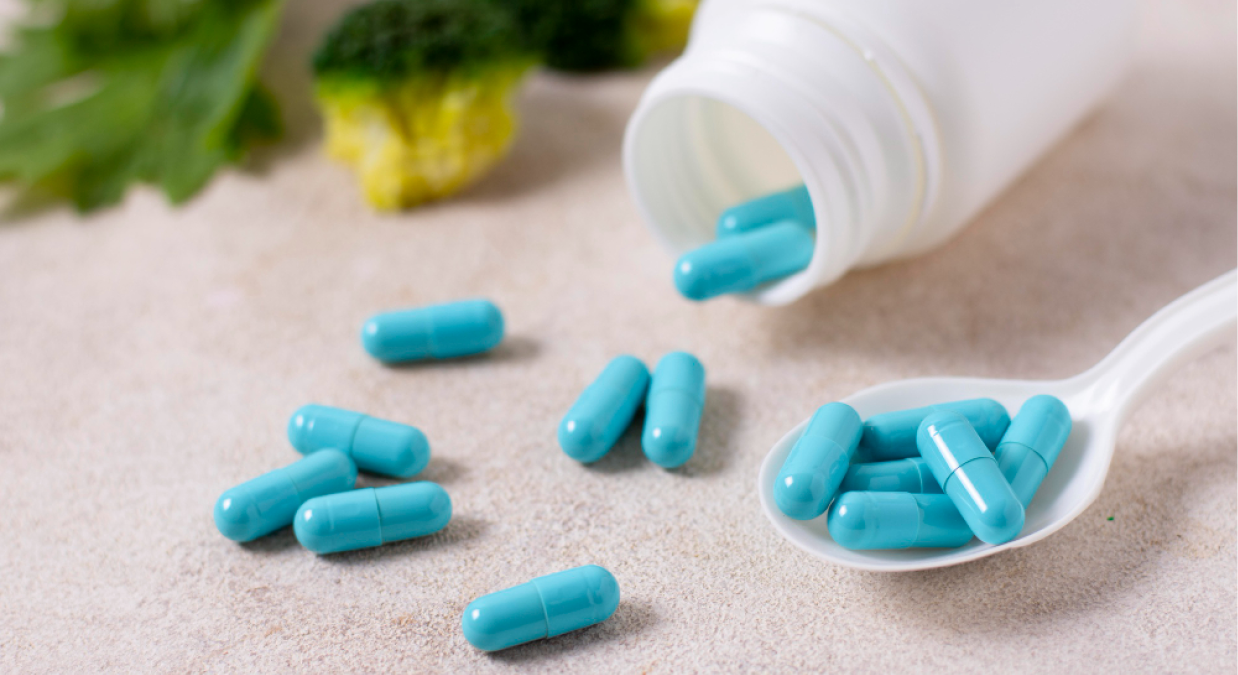by Ravindra Warang
7 minutes
Best Nutraceutical Supplements for Immunity Backed by Science
Explore the top science-backed supplements for immune health—from vitamin D3 to probiotics—and learn how to use them wisely in your daily routine.

In March 2020, as the world went into lockdown, Aakash, a 35-year-old from Mumbai, started a new routine with supplements. Every morning, he would take one zinc tablet, mix a scoop of vitamin C powder into his drink, and have a shot of probiotics. What began as a precaution during the pandemic soon turned into a daily habit focused on boosting his immune health.
Fast forward to 2025, and Aakash is not alone in this. Millions of people now actively support their immune health with various immunity supplements. But here's the catch: the market is flooded with different products—gummies, powders, drops, and capsules—all claiming to "boost immunity." Among these options, it's crucial to identify clinically studied supplements that genuinely deliver results.
So which immunity supplements are actually backed by scientific research? In this comprehensive guide, we cut through the noise and examine the most effective supplements for respiratory health and overall immune support. We'll delve into key ingredients such as selenium, andrographis, and garlic, while also exploring popular herbal remedies like echinacea and elderberry.
Furthermore, we'll highlight essential aspects like evaluating the quality and safety of immunity supplements by checking for cGMP Facility certification on the ingredient list.
Join us on this journey as we explore the realm of immune health supplements and uncover what truly works in fortifying your body's defenses against illnesses like measles and more. To understand where the supplement landscape is heading, explore the top nutraceutical trends in 2025 shaping the future of immune health.
Understanding the Immune System
The immune system is our body's complex defense network, involving white blood cells, cytokines, gut microbiota, and even the skin and mucous membranes. This intricate system plays a crucial role in protecting us from various threats, including infections like HIV infection.
Supporting immunity means nourishing these systems with specific vitamins, minerals, and compounds that:
- Strengthen the innate immune response (first-line defense)
- Enhance the adaptive immune system (long-term protection)
- Modulate inflammation without over-activating it through effective inflammation modulation
Key nutrients such as selenium are essential immune function vitamins and minerals that help maintain robust immune responses. Additionally, incorporating probiotics can significantly impact immune health by supporting gut microbiota balance.
For those undergoing radiation therapy or looking to compare organic vs non-organic immune supplements, it's vital to consider factors like third-party testing to ensure quality and efficacy. Also, pay attention to capsule size and taste for better compliance with supplementation routines.
By understanding these elements, you can effectively support your immune system's integrity and resilience against various challenges.
Top Science-Backed Immune Support Supplements
1. Vitamin C
- Function: Antioxidant, supports production of white blood cells; essential among dietary supplement ingredients for immunity
- Dosage: 500 mg to 1000 mg/day in divided doses
- Evidence: Shown to reduce duration and severity of common cold (Cochrane Review, 2013); clinical evidence for immunity supplements highlights its efficacy
2. Zinc
- Function: Essential for T-cell and immune signaling; crucial in preventing sepsis and supporting overall immune health
- Dosage: 15 to 40 mg/day
- Evidence: Reduces risk and duration of respiratory infections when taken within 24 hours of symptom onset (BMJ Open, 2021); consider side effects and safety of immunity supplements when dosing
3. Vitamin D3
- Function: Regulates immune response, reduces inflammation; important for those undergoing chemotherapy
- Dosage: 1000 to 4000 IU/day (based on blood levels)
- Evidence: Meta-analysis in The BMJ (2017) found supplementation reduces risk of acute respiratory infections
4. Probiotics
- Function: Support gut barrier and balance immune-related microbes; vital for maintaining gut health during illness
- Strains: Lactobacillus rhamnosus GG, Bifidobacterium lactis
- Evidence: Studies show probiotics reduce incidence of upper respiratory tract infections in children and adults (Nutrition Reviews, 2014)
5. Elderberry (Sambucus nigra)
- Function: Contains flavonoids that support immune defenses; popular in organic supplements for their natural efficacy
- Dosage: 300 to 600 mg/day extract
- Evidence: RCTs show elderberry can reduce flu symptoms by 4 days on average (Journal of International Medical Research, 2004)
6. Curcumin
- Function: Modulates inflammation, supports immune balance; known for its anti-inflammatory properties in dietary supplement ingredients for immunity
- Dosage: 500 to 1000 mg/day (with piperine for absorption)
- Evidence: Demonstrated immunomodulatory effects in clinical trials (Journal of Clinical Immunology, 2015)
7. Echinacea
- Function: Stimulates phagocytosis and NK cell activity; often used in herbal remedies for cold prevention
- Dosage: 300 to 900 mg/day (short-term use recommended)
- Evidence: Some meta-analyses show benefit in cold prevention, though results vary
To explore these supplements in greater detail and understand their broader context, check out our comprehensive guide to nutraceuticals.
Summary of Top Immune Supplements
Factors That Influence Supplement Effectiveness
- Bioavailability: The bioavailability of supplements is crucial for their effectiveness. Liposomal forms or combinations (e.g., curcumin + piperine) improve absorption, ensuring that the body effectively utilizes the nutrients. This is especially important for compounds like tea catechins and N-acetylcysteine.
- Timing: Timing of supplement intake plays a vital role in their impact on health. Some nutrients (like zinc) are most effective at the onset of illness, particularly in supporting immune health and mitigating the effects of vitamin C on common cold symptoms.
- Lifestyle: Lifestyle factors affecting immunity, such as poor sleep, stress, and an inadequate diet, can blunt the immune benefits of supplementation. It's essential to consider these factors influencing supplement effectiveness when aiming to boost your immune system. To better navigate product choices, it also helps to understand the core differences between nutraceuticals vs pharmaceuticals and how each supports immunity from different angles
- Underlying Deficiencies: Understanding underlying deficiencies and supplementation is key to successful nutrient intake. Supplementation works best when correcting a deficiency, such as low levels of selenium or glutathione.
By recognizing these factors, you can make informed decisions about using supplements as immune boosters while being mindful of potential side effects and finding dosage recommendations for immune boosters.
Additionally, it's helpful to seek informational resources about how the immune system works and the nutrients involved in its proper functioning.
Myths vs Facts in Immunity Supplementation
Myth 1: "You can overdose on Vitamin C easily."
Fact: While it's important to be aware of facts about vitamin C overdose, excess vitamin C is usually excreted by the body. However, very high doses (>2000 mg) can cause GI distress. Understanding safety information regarding dosage limits and side effects of supplements for immunity support is crucial.
Myth 2: "Supplements alone can prevent infections."
Fact: This is one of the common myths about immunity supplementation. Supplements and infection prevention go hand in hand with hygiene, vaccination, sleep, and nutrition, which remain primary pillars of a healthy immune system.
Myth 3: "All probiotics are the same."
Fact: Strain specificity in probiotics is key. The role of probiotics in immunity is complex, as benefits differ dramatically between strains. It's essential to consider strain specificity when selecting probiotic supplements.
Additionally, incorporating omega-3 fatty acids and preformed vitamin A into your diet can further support immune defense. Don’t forget the role of vitamin D in respiratory infections and overall immunity as well. For those looking for educational on specific vitamins and minerals that support immunity, garlic is a powerful addition known for its immune-boosting properties.
When assessing value for money of immunity supplements, consider supplement price and value carefully to ensure you're getting products that truly support your health. It’s equally important to stay informed about evolving nutraceutical regulations in India, which can directly impact product labeling, claims, and access.
Choosing the Right Immune Supplement
When choosing immune supplements, it's essential to check for:
- Standardized extracts or labeled strains to ensure quality and potency
- Third-party certifications (USP, NSF, FSSAI) that verify safety and efficacy
- Transparent labeling of supplements with clear dosage information
- Avoidance of unnecessary sugar, colors, or fillers in the supplement packaging and design
Consider looking for best immunity supplements that include key ingredients like vitamin C and zinc for immunity, as well as beta-carotene and vitamin E for immune response safety and efficacy.
If you have specific health concerns such as HIV infection or are at risk of illnesses like measles, it's crucial to consult a clinical nutritionist consultation. It’s also essential to be aware of ongoing nutraceutical regulation challenges, which influence product quality, labeling transparency, and accessibility in markets like India.
They can provide guidance on the effectiveness of common immunity supplements like vitamins A and help you understand interactions between supplements and medications or therapies like chemotherapy or radiation therapy.
If in doubt, always consult a clinical nutritionist or functional medicine expert for personalized advice.
Conclusion:
Back in 2020, people reached for supplements out of panic. In 2025, they reach with purpose. Foundational immune health is no longer seasonal; it’s essential. This mindset shift is part of a broader wellness movement that embraces nutraceuticals in preventive medicine as part of daily health optimization.
As clinical research on immunity supplements grows and product quality in immune support improves, the right supplement can truly support resilience against pneumonia, respiratory infections, and even sepsis. But the key lies in making informed supplement choices.
Real immunity isn’t built in a bottle—it’s developed through the daily choices we make, such as incorporating organic ingredients like lemon and considering the detailed nutrient-specific benefits related to infections such as colds.
Intravenous vitamin C (IV vitamin C) and probiotics for immune health are becoming staples for those looking for effective immunity supplements. Additionally, understanding the selenium benefits and risks for immune support is crucial in this journey.
Looking ahead, AI-driven supplement personalization will play a growing role in tailoring immune support strategies to individual needs. Remember, true immune support comes from a holistic approach that prioritizes quality and informed decision-making.
FAQs (Frequently Asked Questions)
Q1. What is the best supplement to boost immunity?
The best supplements to boost immunity include Vitamin C, D3, zinc, and probiotics, as well as vitamin A and vitamin E. These have the most consistent evidence for immune support.
Q2. Are immunity supplements safe for daily use?
Most are safe for daily use of immunity supplements within recommended doses. Always check labels for natural ingredients and consult a healthcare provider, especially if you're seeking information on supplement ingredients for immunity.
Q3. Can I take supplements during a cold or flu?
Yes, you can take supplements during cold or flu; however, many are most effective when taken regularly or at the first sign of symptoms. Consider options like elderberry extract for added benefits.
Q4. Do children need immune supplements?
Only if there's a dietary gap. Children and immune supplements like probiotics and vitamin D3 are commonly recommended, especially in cases where their diet lacks essential nutrients.
Q5. What is the best time to take immune supplements?
Consider the timing of immune supplements based on their type: fat-soluble vitamins like vitamin D are best taken with meals containing fat, while others may be effective when taken in the morning to align with your body's natural rhythms.




